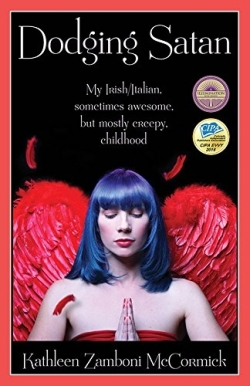It looks like you've stumbled upon a page meant to be read by our code instead of viewed directly. You're probably looking for this page.
INDIES Humor Winner on How to be Seriously Funny on Painful Subjects
Just as the world seems to turn more serious, it may be that we need humor now more than ever. Perhaps this is why many people are turning to comedians to get their news, since the news itself walks a line between tragedy and farce. What can you do except laugh and cry at the same time?

I’m closing our July focus on INDIES winners by interviewing our winner in the Humor category. Dodging Satan, by Kathleen Zamboni McCormick, is a “fictionalized memoir about growing up in the 1960s in a religious and dysfunctional family [that induces] alternating chuckles and cringes,” according to our review of the book. I cannot think of a better way to describe current events, too. So, I contacted McCormick to talk about how to be funny in serious times.
First, boy you’re walking on some dangerous ground when you try to incorporate religion with humor. Did you fear the danger of both not being funny and being offensive at the same time?

Kathleen Zamboni McCormick: 'I don't think taking comedians seriously is a danger! Good comedy functions on a number of levels.'
I’m sure glad I finished the book before we talked because for the most part I didn’t have these worries, but your question might have ignited them! I love to do readings of my work, so I tried out early versions of many chapters of Dodging Satan at conferences where I was able to see if I’d been funny enough, gone too far, or not far enough. There’s nothing like the feedback you get from a live audience.
I also write tons and tons of drafts, trying to tighten the writing and make it sound like it just flowed out that way. You know Mark Twain’s comment, “It would have been shorter if I’d had more time.” The book is quite short because I took the time—I think enough—to ensure its humor and that, at most, it would only ever make someone slightly uncomfortable.
I mean, for many modern thinkers and writers, the history of Christianity, especially Catholicism, seems inextricably linked to patriarchy and misogyny. Humor can make those connections much easier to confront and I hope in time to overcome.
Some reviews of Dodging Satan offer a different answer to why the book is generally read as funny and not offensive. In a review in Commonweal, a highly respected Catholic journal, Anthony Domestico wrote that “Dodging Satan manages to be both theological and comical. Indeed, it finds comedy in theology, even and especially when it’s taking theology seriously.”
The book does take theology seriously, particularly the belief in the presence of the divine in and through material things. St. Teresa speaks of divinity in pots and pans. That’s something my main character, Bridget Flaherty, would truly appreciate. She thinks God is in her father’s slippers with his stinky feet just because they glow in the dark.
So Dodging Satan simply pushes to an extreme what the effects of a belief in God’s physical presence in the world might be to a child with a particularly active imagination.
I’m sure you’re asked this a great deal, but while this is a piece of fiction, how much of this main character is you?
I’m not Bridget, but Bridget is most definitely mine. There are some similarities between Bridget’s religious beliefs and mine as a child, even though Bridget is much more confident and more extreme about everything than I was. But what we really have in common is our almost innate predilection to exaggerate and to turn experiences into stories.
When I was little, I believed stories had the power to keep people safe by somehow magically enveloping us. Family gathering were always filled with stories, and every aspect of them enthralled me. Growing up as an only child in a tense nuclear family, any lack of storytelling seemed to me potentially quite dangerous. So at an early age, I began to fill the gaps with as many stories as I could create, treading a fine line between embellishment and truth, and always searching for ways to be amusing and, in retrospect, a little weird, in order to distract myself from the pain my parents seemed unable to stop causing each other. And to this day, I exaggerate when I tell a story.
This is something I had a field day with in Dodging Satan—I very consciously exaggerated bits of my “real life” story and then created other stories in which it would be quite obvious that Bridget is exaggerating—to everyone but her—which is part of the fun of the book.
You went with an indie, Sand Hill Review Press. How did you find each other and what’s the advantage of working with an independent publisher?
As I was finishing Dodging Satan and looking online at various presses, I happened upon an ad from Sand Hill Review Press saying they were looking for manuscripts that embodied Catholic humor. How could I resist? I sent a letter of inquiry to Tory Hartmann who runs the press. She responded almost immediately that she wanted to see the full manuscript. And I think we were working out a contract the following week. It all happened very quickly.
I love working with an independent publisher. Tory Hartmann has great instincts for all aspects of the publishing and marketing process, and she works closely with her authors. From brainstorming a different book title to taking control of the book cover, Tory is a hands-on publisher.
Tory also nurtures her authors and helps us with our writing careers. She’s forever entering our books in contests. Tory also encourages her authors to connect with each other, something I’ve never heard of a press doing. Before my book was even published, she made me a member of an SHRP author Facebook group where I got to know some SHRP authors quite well. When one person won an IPPY which was being awarded in NYC a couple of years ago, I invited her to fly out from CA and stay with me, even though I’d never met her, because we’d developed such a great online relationship. I invited another SHRP author who writes excellent humorous fiction to be on a panel I was chairing at a Humor conference last fall.
Comedians are, increasingly, taken seriously as observers of society and politics. Is there a danger associated with comedy as “serious” commentary?
I don’t think taking comedians seriously is a danger! Good comedy functions on a number of levels. The fact that you laugh at a joke, that you “get it,” makes you feel clever. But jokes or any kind of comedy can also allow us to understand, or at least to glimpse something else entirely—anger, fear, distress, any kind of issue, personal or political, that isn’t funny at all but that for whatever reason, we’d be less likely to admit without the humor.
A number of people feel Bridget’s finding “the holy” in the holy water is one of the funniest moments in Dodging Satan. But if you think about why her mother is so frantic to get that holy water in the first place, the story points to important issues about family revelations, superstitions, and fears that are much more serious.
So, you’ve won INDIES gold. What are you going to do next?
I’m in the process of writing a sequel to Dodging Satan and am about half done with the first draft. In it, Bridget is sixteen and seventeen—in her junior and senior years of high school. At the moment, she seems to be insisting that the book be way darker than I intended, though I’m hoping she’ll let me lighten it up a little when I get to a second draft. For anyone who’s read Dodging Satan, you know the Flaherty family is filled with family secrets. And Bridget has a number that she’s been revealing to me. We’re still negotiating what’ll get into Book 2!!
Having won INDIES gold, I’m also looking forward to having a lot more readers of Dodging Satan—particularly through libraries—and getting to know some of them through email, in person at readings I’m doing, Skyping with book clubs, whatever. People who read the book really fall in love with Bridget. It’s been so heartening to me when reading Amazon customer reviews or talking to people at readings that a number of readers have explicitly said that they enjoyed the book without having any of the religious connection to it, that their focus was on the network of family relationships among women, or on the issues girls face as they enter adolescence.
I expect that readers with a Catholic background will likely enjoy the book, but one always hopes that your work will appeal to those beyond your immediate clan. And I’m happy to report that Dodging Satan does, so I’m hoping that FR Gold will not only increase my readership, but extend my communication with readers because readers definitely have an impact on writers.

Howard Lovy is executive editor at Foreword Reviews. You can follow him on Twitter @Howard_Lovy
Howard Lovy